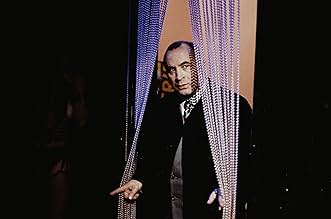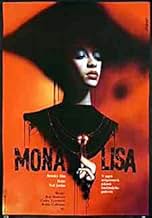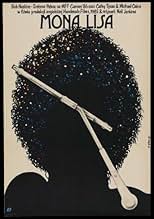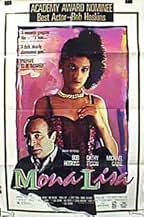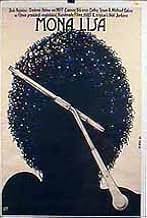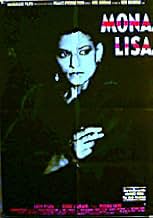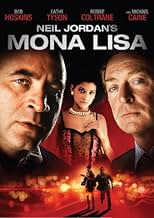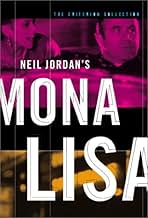ÉVALUATION IMDb
7,3/10
19 k
MA NOTE
Un homme récemment libéré de prison parvient à trouver un emploi en conduisant une call-girl de client en client.Un homme récemment libéré de prison parvient à trouver un emploi en conduisant une call-girl de client en client.Un homme récemment libéré de prison parvient à trouver un emploi en conduisant une call-girl de client en client.
- Nommé pour 1 oscar
- 14 victoires et 14 nominations au total
Joseph Karimbeik
- Raschid
- (as Hossein Karimbeik)
John R. Darling
- Hotel Security
- (as John Darling)
Raad Rawi
- Arab Servant
- (as Raad Raawi)
Histoire
Le saviez-vous
- AnecdotesMortwell's strip club is actually the famous Raymond RevueBar in London's Soho district. The giant prop hand Mortwell sits in was a famous element of the show, visible in a lot of promotional material for the club. At one point George walks past a poster for the Festival of Erotica, a real show at the RevueBar at the time.
- GaffesA camera shadow is visible on the racks of clothes when Simone and George go shopping.
- Générique farfeluIn the credits at the end, "Richard Starkey, MBE" (i.e., Ringo Starr) is listed as "Special Production Assistant."
- ConnexionsFeatured in At the Movies: Desert Hearts/Mona Lisa/Letter to Brezhnev (1986)
- Bandes originalesMona Lisa
by Jay Livingston and Ray Evans
Used by permission of Famous Music Corporation
Performed by Nat 'King' Cole
Original Sound Recording Owned and Controlled by Capitol Records, Inc.
Commentaire en vedette
Bob Hoskins made two widely popular movies in the 1980s and this was one of them. Having seen the other, "The Long Good Friday," I wasn't expecting too much but was pleasantly surprised. Hoskins, just out of the slams, is hired to drive a high-end black hooker, Cathy Tyson, from one wealthy client to another. He grows to care for her and when she asks him for a favor, find a strung-out young girl named Kathy, a former roomie of hers, he agrees. He searches the seedier places of London until he finally digs her up. She very young and very hooked. Robbie Coltrane is Hoskins' friend, and Michael Caine is a sort of procurer. The ending is both distressing and violent -- distressing because some of these characters are fully fleshed and we feel we've come to know them.
The film is quite nicely done. The score makes much use of Nat "King" Cole's ballad, Mona Lisa, evoking mystery, and it's appropriate. The composer has worked what seem to be endless variations of the first four notes of the theme into the score. We hear it in the background often, in minor key, or played exclusively on double bass, or burnished by horns. Those four notes insinuate themselves into the incidental music so often that a listener loses the sense that they are the introduction to a pop song and they come to have an ominous functional autonomy, disembodied from the simple tune that prompted it. They become their own song.
The acting is fine. Bob Hoskins is an essentially moral guy, short and unprepossesing, who first shows up on screen wearing an echt-1970s bell-bottomed leisure suit (he's been in for seven years, remember) and carrying a bouqet of flowers that his wife, berserk with anger, tells him what to do with. His gradual attraction to his passenger is nicely laid out, as are the reasons for his occasional displays of violence. He's a sensitive guy, but not too thoughtful. A lot of things get by him. But, to be fair, they get by the viewer too.
There's an element of humor running through the film, mostly expressed in the relationship between Hoskins and Coltrane, who plays a writer and a sculptor of things made of plastic spaghetti. ("The Japanese have cornered the market.") The dialogue is pretty funny in a low-key way. Hoskins and Coltrane sit watching TV and Hoskins remarks something like, "Remember that guy who was murdered? Well, I did it." Coltrane: "You're not joking?" Hoskins (turning and staring grimly): "I -- never -- joke." Coltrane: "You used to tell that one about the randy gorilla." And here is Hoskins describing his passenger, telling Coltrane that she's not out to exploit him, Hoskins, because "she's a lady." Coltrane: "A lady? I thought you said she was a tart." Hoskins: "Well -- she is, but she's a f****** lady too."
And Cathy Tyson almost beggars description, tall, slender, lithe, not staggeringly beautiful or sexy, but her appeal extends far beyond mere appearance. She's gorgeous in the most personal way. She tends to keep her face down and her eyes lowered, almost demurely, and her voice is soft and low, just above a whisper, although you never have to strain to hear what she's saying because her pronunciation is modulated and precise. It's soothing, in control and at the same time reassuring, the voice of an announcer on a late-night FM station playing nothing but classical music. You could listen to her for hours. You could look at her for hours too, for that matter. Michael Caine doesn't have a big or showy part, but he's so reliable that he's always a pleasure to see on screen. I can't think of a single film that has been damaged by his presence, although he's been in a few bummers.
The photography is perceptive. We get a good deal of local color not only from the London locations but from "the seaside," where everything comes to a head. There isn't a lot of violence. What there is of it is quick and pointed.
See it if you get the chance.
The film is quite nicely done. The score makes much use of Nat "King" Cole's ballad, Mona Lisa, evoking mystery, and it's appropriate. The composer has worked what seem to be endless variations of the first four notes of the theme into the score. We hear it in the background often, in minor key, or played exclusively on double bass, or burnished by horns. Those four notes insinuate themselves into the incidental music so often that a listener loses the sense that they are the introduction to a pop song and they come to have an ominous functional autonomy, disembodied from the simple tune that prompted it. They become their own song.
The acting is fine. Bob Hoskins is an essentially moral guy, short and unprepossesing, who first shows up on screen wearing an echt-1970s bell-bottomed leisure suit (he's been in for seven years, remember) and carrying a bouqet of flowers that his wife, berserk with anger, tells him what to do with. His gradual attraction to his passenger is nicely laid out, as are the reasons for his occasional displays of violence. He's a sensitive guy, but not too thoughtful. A lot of things get by him. But, to be fair, they get by the viewer too.
There's an element of humor running through the film, mostly expressed in the relationship between Hoskins and Coltrane, who plays a writer and a sculptor of things made of plastic spaghetti. ("The Japanese have cornered the market.") The dialogue is pretty funny in a low-key way. Hoskins and Coltrane sit watching TV and Hoskins remarks something like, "Remember that guy who was murdered? Well, I did it." Coltrane: "You're not joking?" Hoskins (turning and staring grimly): "I -- never -- joke." Coltrane: "You used to tell that one about the randy gorilla." And here is Hoskins describing his passenger, telling Coltrane that she's not out to exploit him, Hoskins, because "she's a lady." Coltrane: "A lady? I thought you said she was a tart." Hoskins: "Well -- she is, but she's a f****** lady too."
And Cathy Tyson almost beggars description, tall, slender, lithe, not staggeringly beautiful or sexy, but her appeal extends far beyond mere appearance. She's gorgeous in the most personal way. She tends to keep her face down and her eyes lowered, almost demurely, and her voice is soft and low, just above a whisper, although you never have to strain to hear what she's saying because her pronunciation is modulated and precise. It's soothing, in control and at the same time reassuring, the voice of an announcer on a late-night FM station playing nothing but classical music. You could listen to her for hours. You could look at her for hours too, for that matter. Michael Caine doesn't have a big or showy part, but he's so reliable that he's always a pleasure to see on screen. I can't think of a single film that has been damaged by his presence, although he's been in a few bummers.
The photography is perceptive. We get a good deal of local color not only from the London locations but from "the seaside," where everything comes to a head. There isn't a lot of violence. What there is of it is quick and pointed.
See it if you get the chance.
- rmax304823
- 1 mars 2003
- Lien permanent
Meilleurs choix
Connectez-vous pour évaluer et surveiller les recommandations personnalisées
- How long is Mona Lisa?Propulsé par Alexa
Détails
- Date de sortie
- Pays d’origine
- Site officiel
- Langue
- Aussi connu sous le nom de
- 蒙娜麗莎
- Lieux de tournage
- Crystal Palace Road, East Dulwich, London, Greater London, Angleterre, Royaume-Uni(where George is confronted by his daughter and wife)
- sociétés de production
- Consultez plus de crédits d'entreprise sur IMDbPro
Box-office
- Brut – États-Unis et Canada
- 5 794 184 $ US
- Fin de semaine d'ouverture – États-Unis et Canada
- 99 361 $ US
- 15 juin 1986
- Brut – à l'échelle mondiale
- 5 794 184 $ US
Contribuer à cette page
Suggérer une modification ou ajouter du contenu manquant





